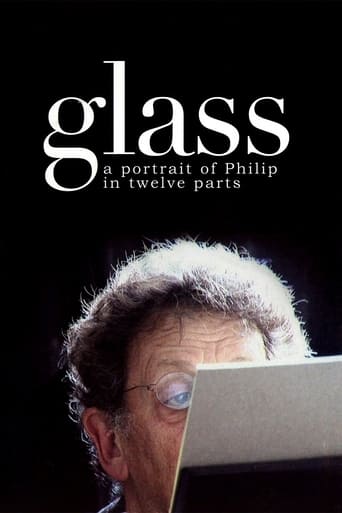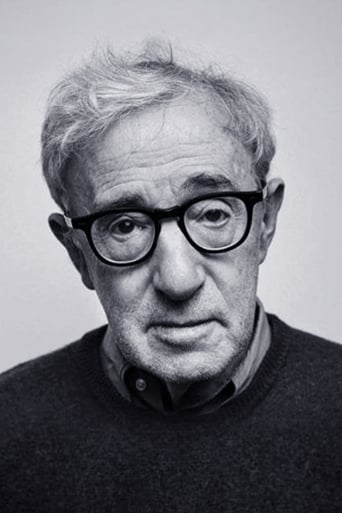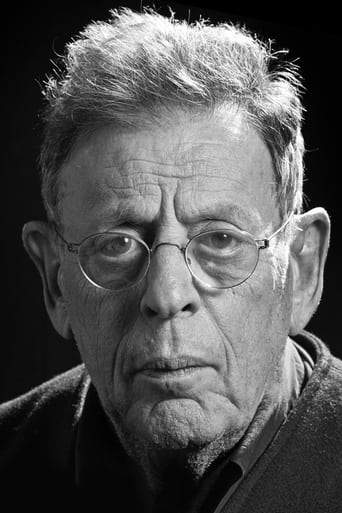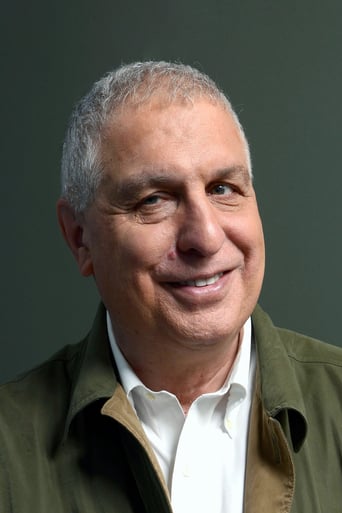

Glass: A Portrait of Philip in Twelve Parts (2007)
Scott Hicks documents an eventful year in the career and personal life of distinguished Western classical composer Philip Glass as he interacts with a number of friends and collaborators, who include Chuck Close, Ravi Shankar, and Martin Scorsese.
Watch Trailer
Cast


Reviews
Yawn. Poorly Filmed Snooze Fest.
Excellent, a Must See
The film creates a perfect balance between action and depth of basic needs, in the midst of an infertile atmosphere.
Each character in this movie — down to the smallest one — is an individual rather than a type, prone to spontaneous changes of mood and sometimes amusing outbursts of pettiness or ill humor.
I thought the same as the above commenter--Glass is a great composer but not an interesting person (something that often happens with artists--it all goes into the work) until I heard him speak the following evening and he was perfectly interesting...because he was talking about MUSIC--something the director forgot to ask him about in the film. This is one of the most superficial biographical films I've seen, two hours of tedium, watching Glass make pizza, play with his kids, practice t'ai chi etc. his wife giving away her Internet password--while the music dipped in and out in tiny snippets. Glass deserves much much better.
In July 2005, Australian filmmaker Scott Hicks started shooting a documentary about the composer Philip Glass to celebrate his 70th birthday in 2007. Over the next 18 months, Hicks filmed Philip across three continents - from his annual ride on the Coney Island "Cyclone" roller coaster, to the world premiere of his new opera in Germany and in performance with a didgeridoo virtuoso Mark Atkins in Australia. Born in Baltimore, Glass discovered music as he worked in his father's radio store. Hicks documents his early studies and the somewhat precocious formation of his own ensemble to make certain his unusual compositions had a chance to find an audience. The 12 parts of the film focus on different aspects of Glass's work and both public and private worlds. The rapport Hicks developed over the prolonged shoot is indicated by candid conversations in which Glass addresses the off-camera Hicks. This rapport results in an affectionate and intimate portrait of Glass. A recent visitor to Melbourne to perform Book of Longing, his collaboration with Leonard Cohen, Glass's works include opera, theater pieces, dance, film and song. Fan's of Glass's music will love this film and it offers a wonderful introduction for strangers to his oeuvre.
I have a huge level of respect and admiration for Philip Glass' musical ability and own a significant portion of his work, most of which makes for great listening, but the man himself really isn't very interesting. He has no secrets, which would be fine if there was anything interesting here. The bottom line is that he's a man devoted to his work, who has an organic, natural musical ability, and a tendency to switch between women and religions like television channels. There's moments where he's really interesting, and for the most part he's affable and fun to watch, but this film, in spite of its mosaic-like structure, is a film about someone whose music is far more interesting than they are. Hicks' cinematography is excellent, but the film is so superficial and bland that I find it amazing to think that anyone was particularly affected by it. There are twelve parts to the film, I'd say about five of those were entertaining.4/10
Living in Toronto, once a year I get the benefit of having the world's largest film festival come to my doorstep. Tonight I was lucky enough to be in the audience for the first screening of Scott Hicks' new biographical movie on composer Philip Glass. I did not know what to expect from this film, namely because I was only vaguely familiar with Glass' work and also because I was skeptical that a movie about a minimalist composer would be either entertaining or fascinating. But my initial doubts were completely wrong - the movie blew me away. The movie was very profound, extremely interesting, and surprisingly funny - not to forget full of beautiful music (this movie has introduced me to the work of this wonderful composer who I would otherwise have never explored). The cinematography was also excellent - far beyond what you get in the usual documentary. Hicks' breakdown of Glass' life into 12 distinct stages was the perfect way to show him at his different mental states. Near the start of the movie, Hicks shows footage of Glass that you (or at least those who are not Glass followers)originally think has nothing to do with his music. Yet as the movie goes on, and you reach deeper and deeper within Glass'life and his head, you realize that what the other footage is showing is key to understanding Glass because it makes up an essential part of Glass' musical origins/motivations. The movie begins slowly but builds into a powerful crescendo.Glass' life is not only interesting due to his line of work, for he paints a good picture of how he engages in a complex artistic process. His comments on music and art are original and very worthwhile; even if you have no interest in Glass' music, his comments on his process are worthwhile for anyone interested in art of any sort. This is a movie worth seeing.




